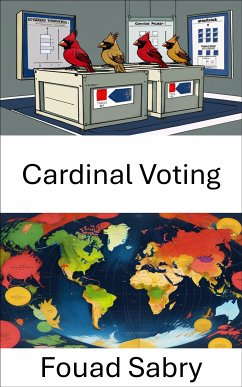Unlock the power of voting systems with "Cardinal Voting," part of the "Political Science" series. This book delves into cardinal voting—a revolutionary method where voters rate candidates, offering a new perspective on electoral fairness and decision-making.
1-Cardinal Voting-Learn the basics of cardinal voting, where voters use a numerical scale to express preferences, providing a richer view than traditional methods.
2-Approval Voting-Understand approval voting, where voters simply approve or disapprove of candidates, and its connection to cardinal voting for better accuracy.
3-Score Voting-Explore score voting, where candidates are rated, and its impact on elections compared to other systems.
4-Condorcet Paradox-Discover the Condorcet paradox and its effects on cardinal voting by highlighting voting system complexities.
5-Arrow's Impossibility Theorem-Analyze Arrow's theorem and its implications for designing effective cardinal voting systems.
6-Independence of Irrelevant Alternatives-Examine this key criterion affecting fairness in voting systems and its relevance to cardinal voting.
7-Gibbard–Satterthwaite Theorem-Understand this theorem’s insights into strategic voting and its limitations within cardinal voting.
8-Bucklin Voting-Learn about Bucklin voting, blending ranked and cardinal voting elements, and its decision-making impact.
9-Majority Criterion-Review the majority criterion’s role in ensuring cardinal voting reflects true majority preferences.
10-Positional Voting-Compare positional and cardinal voting systems, and see how each affects electoral outcomes.
11-Strategic Voting-Investigate strategic voting and its impact on the integrity of cardinal voting systems.
12-Allan Gibbard-Explore Allan Gibbard’s contributions to voting theory and their influence on cardinal voting.
13-Social Choice and Individual Values-Examine the link between social choice theory and individual preferences in cardinal voting.
14-Later-no-harm Criterion-Understand how this criterion preserves voter preferences in cardinal voting systems.
15-Majority Judgment-Consider majority judgment as an alternative to cardinal voting and its potential benefits.
16-Ranked Voting-Compare ranked voting with cardinal voting to evaluate the strengths and weaknesses of each.
17-Comparison of Electoral Systems-Get a detailed comparison of electoral systems and the unique benefits of cardinal voting.
18-Gibbard's Theorem-Revisit Gibbard’s theorem and its effect on strategic behavior in cardinal voting.
19-Combined Approval Voting-Explore combined approval voting and its integration with cardinal voting principles.
20-Highest Median Voting Rules-Understand highest median voting rules and their role in cardinal voting.
21-Usual Judgment-Learn about usual judgment and its impact on electoral outcomes alongside cardinal voting.
"Cardinal Voting" offers deep insights into electoral systems, bridging theory with practical application. Elevate your understanding of voting systems today.
1-Cardinal Voting-Learn the basics of cardinal voting, where voters use a numerical scale to express preferences, providing a richer view than traditional methods.
2-Approval Voting-Understand approval voting, where voters simply approve or disapprove of candidates, and its connection to cardinal voting for better accuracy.
3-Score Voting-Explore score voting, where candidates are rated, and its impact on elections compared to other systems.
4-Condorcet Paradox-Discover the Condorcet paradox and its effects on cardinal voting by highlighting voting system complexities.
5-Arrow's Impossibility Theorem-Analyze Arrow's theorem and its implications for designing effective cardinal voting systems.
6-Independence of Irrelevant Alternatives-Examine this key criterion affecting fairness in voting systems and its relevance to cardinal voting.
7-Gibbard–Satterthwaite Theorem-Understand this theorem’s insights into strategic voting and its limitations within cardinal voting.
8-Bucklin Voting-Learn about Bucklin voting, blending ranked and cardinal voting elements, and its decision-making impact.
9-Majority Criterion-Review the majority criterion’s role in ensuring cardinal voting reflects true majority preferences.
10-Positional Voting-Compare positional and cardinal voting systems, and see how each affects electoral outcomes.
11-Strategic Voting-Investigate strategic voting and its impact on the integrity of cardinal voting systems.
12-Allan Gibbard-Explore Allan Gibbard’s contributions to voting theory and their influence on cardinal voting.
13-Social Choice and Individual Values-Examine the link between social choice theory and individual preferences in cardinal voting.
14-Later-no-harm Criterion-Understand how this criterion preserves voter preferences in cardinal voting systems.
15-Majority Judgment-Consider majority judgment as an alternative to cardinal voting and its potential benefits.
16-Ranked Voting-Compare ranked voting with cardinal voting to evaluate the strengths and weaknesses of each.
17-Comparison of Electoral Systems-Get a detailed comparison of electoral systems and the unique benefits of cardinal voting.
18-Gibbard's Theorem-Revisit Gibbard’s theorem and its effect on strategic behavior in cardinal voting.
19-Combined Approval Voting-Explore combined approval voting and its integration with cardinal voting principles.
20-Highest Median Voting Rules-Understand highest median voting rules and their role in cardinal voting.
21-Usual Judgment-Learn about usual judgment and its impact on electoral outcomes alongside cardinal voting.
"Cardinal Voting" offers deep insights into electoral systems, bridging theory with practical application. Elevate your understanding of voting systems today.








